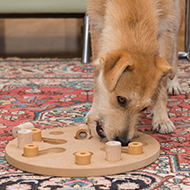Three-quarters of UK dogs show signs of poor mental health

The survey found that 74 per cent of dogs in the UK display signs of behavioural issues.
More than three-quarters of the nation's dogs show signs of poor mental health, according to new research.
Findings published by Guide Dogs reveal that 74 per cent of dogs in the UK display signs of behavioural issues, such as anxiety and frustration, with around 18 per cent exhibiting symptoms as often as every week.
Loss of appetite, destructiveness and low activity levels are cited as the most common signs of poor canine mental health. Barking or hyperactivity could also be signs that a dog is bored or frustrated, the charity says.
Guide Dogs’ findings also show that many dog owners cannot identify the signs of poor mental health, with just 36 per cent saying they know what to look for. A further 24 per cent of owners surveyed were not aware that dogs could suffer from poor mental health.
In light of its findings, Guide Dogs is calling on owners to carry out enrichment activities with their dog ‘little and often' and to consider 'quality, not quantity’.
Puzzle feeders, games or sensory activities can all help boost a dog's mood, but they should be mixed up throughout the week to keep it interesting, the charity said.
Dr Helen Whiteside, chief scientific office at Guide Dogs, commented: “It’s an outdated viewpoint to think that dogs just need a walk or two a day to be content. Without different forms of mental stimulation, dogs can begin to show signs of behavioural issues, such as anxiety and frustration, which can have a huge impact on their mental wellbeing.
“Dogs can thrive when given new tasks and opportunities to engage. Integrating a mix of canine enrichment activities into your dog’s day-to-day life is the best way to help stimulate their senses, encourage them to practice natural behaviours, and improve their wellbeing. As well as being a lot of fun for you and your dog.”
She added: “Not all dogs are able to take on the exciting challenges of being a guide dog, but they can all benefit from other forms of canine enrichment.”



 The latest
The latest